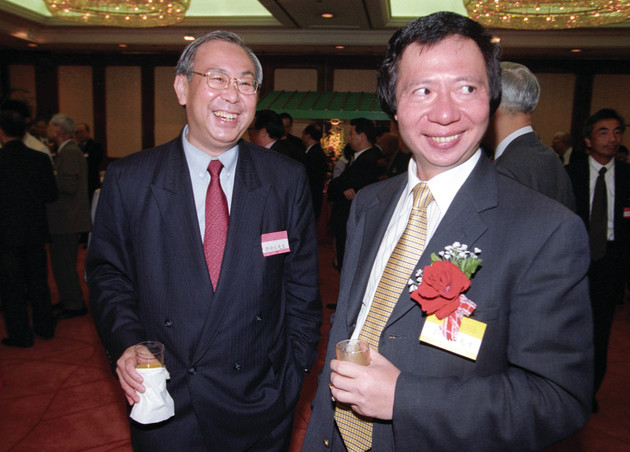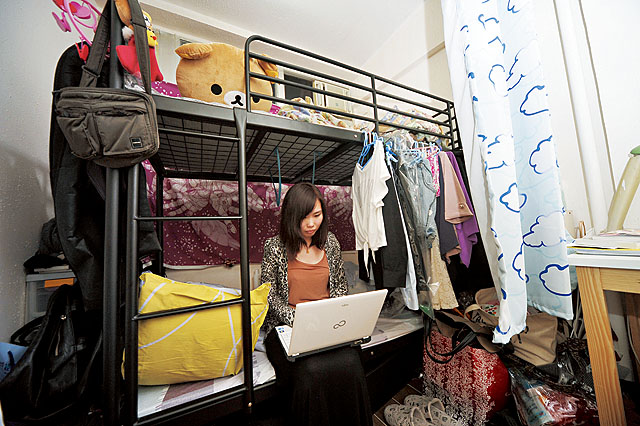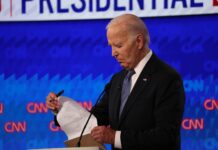The high cost of housing has been the number one concern for the people Hong Kong over the last decade
Pasha, Socialist Action
Ordinary working people can no longer find a decent home to live in, especially young people. The number of applicants in the queue for public housing reached a record high of 270,000 by the end of 2014. Of these, the ratio of young applicants below 30 years of age is also rising every year, from 14.5 percent in 2009 to 26.9 percent in 2012. The housing problem is not only worsening, but is also increasingly hitting the newer generation.
In view of the large number of young applicants for public housing, the government and bourgeoisie commentators have always put the blame on the “laziness” or “lack of ambition” of young people. The fact is, however, working people’s income is unable to catch up with the increase in average house prices. The nominal wage of the average worker has only increased by 10-20 percent since 2001, and real wages in 2014 have actually fallen by 7.4 percent! On the other hand, average house prices are three times their level 10 years ago, and rents have doubled during that period.
17 times yearly household income
According to research done by Demographia, Hong Kong’s house prices are 17 times average annual household income – a figure not only topping the world, but also an historical record! This research holds that a ratio of 3 to 1 is “affordable”, and that the ratio of 6.7 times household incomes in Australia is already worrying. Under such a dire situation in Hong Kong, working people and youths have no choice but to rely on public housing.
Bernard Chan, member of the Executive Council, admitted in an article in the South China Morning Post that Hong Kong’s problem is “extreme”. The Long Term Housing Strategy (LTHS) Steering Committee released a 10-year plan to solve the crisis last year, proposing to build a total of 470,000 housing units by 2024. Yet, 40 percent will be private housing, and of the rest only 200,000 will be public rental units (80,000 would fall under the subsidized Home Ownership Scheme). With an average annual supply of 20,000 units of public housing, it would take 13.5 years to clear the 270,000 current applicants waiting in line. Not to mention the more than 30,000 new applicants for public housing each year.
In fact, the Housing Authority admitted that there will be only 77,100 new public units available over the coming five years, that is only 15,400 units each year – far short of the 20,000 annual target. Moreover, with another government coming to power in 2017, new policies may replace old ones, much like the “85,000 Policy” of Tung Chee-hwa was discontinued.
Socialists believe that housing is a basic need of humans; hence it should be seen as a human right. Socialist Action demands that the public housing supply annually should be increased to 50,000 units, to meet the urgent need for housing of the masses in Hong Kong.
200,000 empty apartments
The government has always used excuses such as land shortage, or blaming people for opposing its North-East Development Plan, or any plans to develop the country parks. However, the true problem lies within the pre-determined 6:4 ratio of public and private housing. What is needed is to redress the balance away from today’s heavy emphasis on private housing. With lower building density, private housing takes up much more land than public units, thus if all the land allocated for private units is used for public housing instead, it is not impossible to reach a 10-year target of 500,000 public units, which would go a long way to solve the housing problem.
Yet Bernard Chan wrote in the same article that “we cannot suddenly make 80 per cent of our housing public sector and/or affordable”. Even if the average price of private housing should drop by 50 percent, this is still 8.5 times what an average household makes in a year, which can hardly be considered affordable. What is more, large amount of residential units are concentrated in the hands of the super-rich, with the top ten landlords owning more than 40,000 units, and the top 100 owning 79,000.
The government claims that increasing the supply of private housing will solve the problem. But there are already 200,000 empty private units, all in the hands of the rich for the purpose of hoarding and speculation. The real situation in Hong Kong is that there are homes without people, and there are people without homes – adding in more private housing will not solve the problem. As for these empty units, socialists argue that once absenteeism is proven, they should be confiscated and put into the public sector to be used to cut the public housing queue.

The capitalist government is on the side of the big corporations and property tycoons. Despite the widespread and urgent need to expand the social welfare and public housing of the people, the government prioritises “White Elephant” infrastructure projects with billions of dollars of public money to transfer wealth to the rich and to prop up property prices. The trial and the conviction of Rafael Hui and Sun Hung Kai Properties co-chairman Thomas Kwok exposed evidence of corruption and confirmed the widely suspected collusion between government officials and Hong Kong property tycoons. This poses the issue: who should own and control the property and public policies, the people or the tycoons? To solve the crisis, the stranglehold of “property hegemony” needs to be broken, which can only be done by taking the big property conglomerates, banks and financial companies into public ownership and democratic control.




